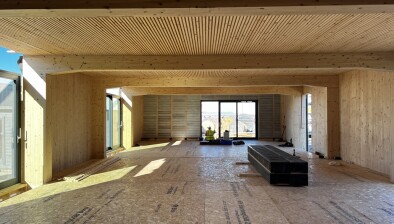CSIC set to inspire next generation with new future skills strategy
Construction Scotland Innovation Centre (CSIC) has launched a new strategy to put future generations in the driving seat for innovation in the industry.
The Future Skills Strategy will put the technology that’s unlocking innovation in the sector in the hands of school pupils, college and university students as well as industry leaders.
Building on the success of the BIM in Practice and College Innovation programmes, the new strategy will unlock partnerships with schools, further education providers, public sector partners and industry. A range of interactive courses and activities will help to widen participation and educate young people about the career opportunities available within the industry, and what those roles might look like in the future.
Rohan Bush, head of public partnerships & future workforce at CSIC, said: “Simply telling young people that they could have a great future in construction isn’t that effective. But let them play with the tech that will be part of that future, and they come back wanting to know more. We are really excited about this new strategy and the opportunities it offers.
“The increased use of digital technologies is changing how we work, and gives real opportunities to work smarter, efficiently and more sustainably. The new programmes also offer those currently working in the industry the opportunity to expand and develop their skills and knowledge.”
CSIC is working collaboratively with a number of partners to deliver new activities. The Play with the Future programme will give school pupils the opportunity to experience the future of construction by utilising pioneering equipment housed within the Innovation Factory. Other elements of this programme will encourage them to consider the design and build aspects of smart homes for an ageing population.
Delivered in conjunction with Skills Development Scotland (SDS) and Developing the Young Workforce (DYW), young people will anticipate and consider what an individual’s needs might be and how homes can be adapted using digital and assistive technology. They will also get the opportunity to be hands on with collaborative robots to see how they might work alongside people in the future.
Elaine Ellis, skills planning manager at Skills Development Scotland, said: “We are delighted to be working with Construction Scotland Innovation Centre team to showcase the innovation and skills opportunities within the construction industry.”
Another programme activity, ‘Construction Virtual Reality Training’ (CONVERT) will offer learners the opportunity to experience different immersive learning environments including working at height, the use of drones in construction, Mimbus woodcutting and paint spraying modules and the ‘Virtual Building Element Environment’ (VBEE). In VBEE, users will be set a task to build either a house, an industrial unit or an offsite modular building, and will be presented with a range of scenarios.
The decisions they make during the process, including the selection and use of materials, technical specifications, and processes used, will be presented and evaluated on completion. This programme, which is funded by CITB and led by Construction Wales Innovation Centre, can be used not only by young people considering a career in construction, but also apprentices and workers already employed in the industry. Virtual Reality helps to give learners a thorough overview of all aspects of a project and also helps to foster a culture of collaboration, understanding and appreciation of other roles and the impact they have on each other.
These programmes are especially important as the industry looks to drive productivity and growth, and create a workforce that is innovative, dynamic and globally competitive.
CSIC would like to hear from industry, further education providers and public sector partners who are interested in these programmes, and also in using the Innovation Factory, CSIC’s 35,000 sq ft hub that provides an open access, low cost, safe environment and access to £2 million of state-of-the-art equipment.

















